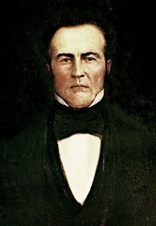Never Send to Know For Whom the Bell Tolls

John Bell, a Whig U.S. senator from Tennessee and presidential candidate, was born on this day in 1797 near Nashville.
As a congressman representing Nashville, Bell was a partisan of fellow Democrat and Tennessean Andrew Jackson, but following a personal rift with Jackson, Bell became the leader of the Whig Party in Tennessee, and became the bitter enemy of Jackson protégé James K. Polk, beating Polk to become speaker of the House. In 1841, President William Harrison appointed Bell as his secretary of war; but following Harrison’s death a few weeks later, Bell resigned along with other Harrison cabinet officials when it became clear that Harrison’s successor, John Tyler, was not committed to the Whig legislative agenda.
In 1847, Bell was elected to the U.S. Senate, where he adopted a non-confrontational stance with respect to slavery issues (despite the fact that he owned many slaves himself), supporting President Taylor’s plan to admit territories to statehood even though federal law prohibited the ownership of slaves in federal territories, thus ensuring free states where there had been free territories, while showing no patience for abolitionists who would outlaw slavery in the South.
As the Whig Party fell into decline, Bell supported Millard Fillmore’s Know-Nothing presidential candidacy in 1856. Bell saw the new Republican Party as dangerous to the preservation of the Union due to its strong anti-slavery rhetoric, yet could not adopt the unequivocally pro-slavery positions of the Democrats; in Bell’s view, the only way to stop sectionalism from growing was to ignore the slavery issue entirely.
If you thought the presidential election of 2000 was a bit crazy (and, admittedly, it was), the 1860 presidential election was downright wacky. In 1860, like-minded former Whigs and those who supported Fillmore ("venerable gentlemen representing a generation of almost forgotten politicians," most of whom "had retired from public life involuntarily rather than by choice," according to historian H.P. Nash, Jr.) nominated Bell as their presidential candidate under the Constitutional Union Party banner. Misunderstanding the intensity of the slavery issue, Bell was badly defeated in the 1860 election, which almost appeared to be two elections -- one in the North (Lincoln vs. Douglas) and one in the South (Breckinridge vs. Bell); Bell polled 12.6% nationwide, finishing in 4th place overall.
As the South began to succeed from the Union following Lincoln’s election, Bell reluctantly supported Tennessee’s secession. For the duration of the Civil War he lived in the deep South, pacing the floors of his house and lamenting the tragedy of the conflict. He died on September 10, 1869.
Categories: American-Politicians, Presidential-Campaigns





0 Comments:
Post a Comment
Subscribe to Post Comments [Atom]
<< Home